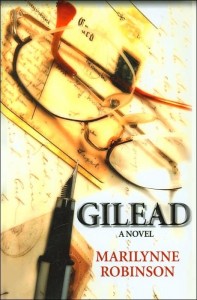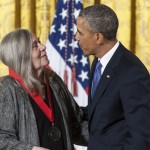[5-minute read]
#ObamasFavoriteWriter is the most reductive, semi-dismissive and ‘Net-friendly way to capsulize her, so I won’t. (Um…)
Let’s start this way: Before 2016, I had never heard of Marilynne Robinson, or at least her name never stuck to my brain casing. Now, I have read all four of her novels, listened to a lecture and two interviews, and read and re-read her Paris Review discussion and one book of essays while ploughing through a second, which was my main accomplishment yesterday and the day before. I think about her work, and about her – where does such a person come from? – constantly. I find myself pestering everybody I like whom I consider might be even a remote candidate to read her. She’s a glorious read.
It started with Phyllis¹. She is a retired university prof who decided, as one of her several voluntary teach-ins, to start a book-club looking at great modern fiction with spiritual themes and underpinnings — as if such literature could actually be found in what often seems to be a doubtful, jaggedly ironic and chronically disillusioned age. Surprise! It can be! Phyllis knew where to look. And so, I got to be the token male among a dozen-and-a-half thoughtful, quietly eager book-types. We read Louise Erdrich and Bahiyyih Nakhjavani and the conversations were fun and light-shedding.
¹ Nobody names a daughter Phyllis anymore, yet once upon an old time it was a beautiful name suggestive of green leaves and ancient Greek loyalty and goddess-love. Not bad, Phyll!
But mostly, we careened off on a helpless Marilynne Robinson jag. We couldn’t stop. We didn’t include her 1980 first novel, Housekeeping, which brought her critical praise and a “writers’ writer” designation and a faculty position at the University of Iowa. (I went back and read that one on my own, after I’d finished her Iowa-based sort of a trilogy but not really.) Our little group pulled its chairs up in a circle and started talking about Robinson’s Pulitzer Prize-winning Gilead, which had stunned me and shaken the ground of American fiction at its 2004 publication – not that I noticed! (I show up late to some of the very best parties.)
Gilead came nearly a quarter-century after Housekeeping. I remember Frank McCourt’s reaction to questions about how late in his life his “overnight success” had come. (His 1996 memoir, Angela’s Ashes, was an international publishing sensation; he was well into his 60s when it came out.) “I was TEACHING,” he wrote, “that’s why it took so long!”² Robinson might give the same explanation, as she is a long-time faculty member of the legendary Iowa writers workshop. However, she has said in interviews that, not wanting to contribute shallow or derivative novels to the stream of American literature, she wanted to read. And think, as well as teach. And well she did, and does. She is a profound scholar: history, literature, religion, philosophy. Gilead, far from being a work that she laboured over for the intervening decades, came to her quite quickly in the voice of John Ames, a rural Iowa pastor.
² Ever grateful, I am, for McCourt’s lesser-known third book Teacher Man, an in-depth account of his locally legendary career as a high school English teacher in New York City. My review of Teacher Man has a special place, one of the few JHdotCOM pieces to run elsewhere before it ran here, and as a free-lance piece for which I Actually Got Paid.

The NY Times review is worth a read, if you’re hungry.
As I read Gilead, I kept asking myself, How is Robinson doing this? How can a novel about a Christian minister in a nowhere town even get published, let alone be this gripping and so smartly written? Simply put, it is a literary miracle, and our little group couldn’t stop, since neither could Ms. Robinson. She wrote Gilead – it is a tiny actual town in Iowa – as the letter that the aging Pastor Ames writes to his young son, the product of a strange, late and utterly unexpected marriage to a much younger woman. Ames wants to explain himself before he dies, so that the boy will, when he comes of age, know something of his departed father. As a novelistic result, so do we, as well as making other compelling acquaintances of the imaginary kind: Ames’s young wife Lila, his lifelong friend and intellectual sparring partner Robert Boughton, and Boughton’s troubled and troublesome son Jack. Robinson couldn’t get enough of these characters either, to our good luck and delight.

